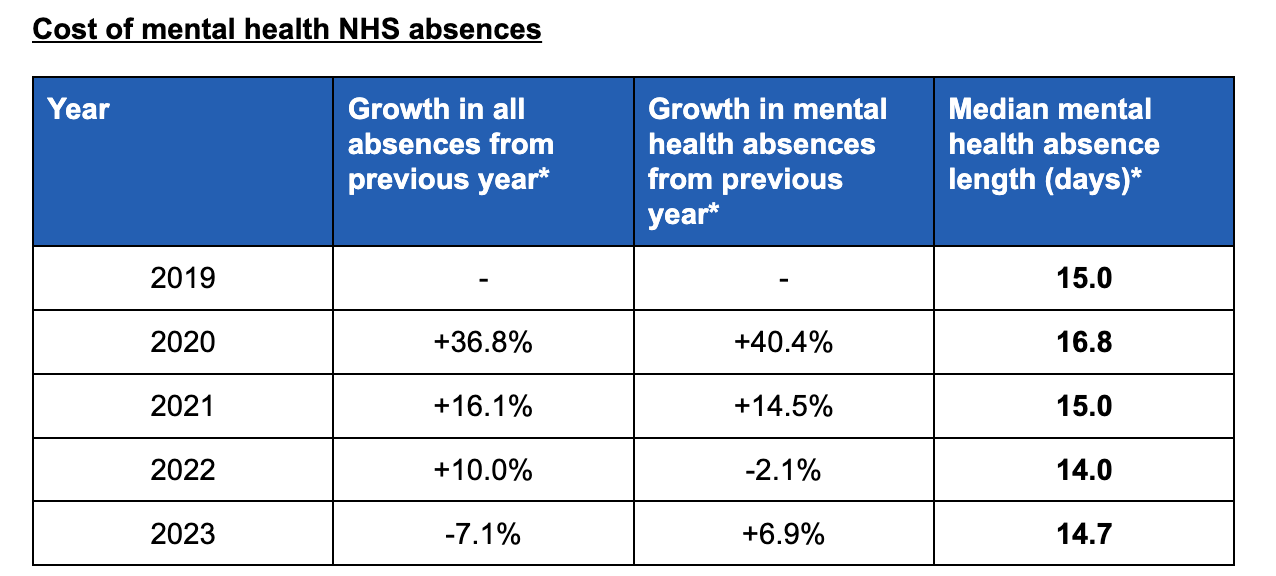Comments
- No comments found

The median number of absences for mental health leave in the NHS has increased by an estimated 68% over the last five years.
That’s according to Digital PR Agency, Reboot Online, who analysed over 1.7 million absent records for over 500,000 NHS staff.
To determine the effect of mental illness on the NHS, Reboot Online submitted a freedom of information (FOI) request to every NHS trust around the UK for information surrounding sick leave, reasons and cost. Out of 229 trusts, 42 responded with the requested data, providing a sum of over 1,700,000 absence records for over 512,000 NHS staffers. These trusts are geographically distributed across the UK, and act as a representative sample of the NHS as a whole.
Key findings:
The estimated median time off for NHS Full Time Equivalent staff taking sick leave is 19.1 days a year
The median absence for NHS FTE staff taking sick leave for their mental health was at least 14 days for the last five years according to the FOI
The cost of mental health absences is an estimated £2 million per NHS trust
Reboot Digital PR Agency estimates the NHS loses an £2.1 billion a year to staff illnesses
24% of all absences for NHS employees are due to mental health problems, according to NHS data.

The median length of mental health absences for NHS staff has been approximately 15 days for the last five years, based on the data gathered. This figure peaked during the COVID-19 pandemic, at 16.8 days in 2020, but has remained at 14 or more since.
With the exception of 2022, the FOI data shows that every year saw an increase in the number of days off attributed to mental health issues. 2020 saw a considerable spike of more than a third (40%), while 2021 and 2023 saw a 14.5% and 6.9% increase in mental health absence days respectively.
This cannot be solely ascribed to an increase in NHS Full Time Equivalent (FTE) staff. In 2019, there were an estimated 3,248 absences per 1,000 FTE staff. Four years on, in 2023, there were 4,403 absences per 1,000 FTE staff: a rise of more than one-third (35,6%).
Mental health leave is also often responsible for long illnesses in the NHS. Mental health issues were estimated to be responsible for 12.5% of all illnesses lasting 800 days or more. This is more than cancers, and infections, which both caused an estimated 8.8% of long absences respectively.
According to published NHS data, 24% of absences in this period were due to mental health. The FOI data also suggests that mental health sick days are also beginning to increase at a faster rate than total sick days. While the growth of absent days for all illnesses has been steadily decreasing since 2020, and actually saw a decrease of -7.1% in 2023, mental health absent days are more unpredictable. While they did reduce slightly by -2.1% in 2022, they rose again by 6.9% in 2023.
Reboot Digital PR Agency estimates that NHS FTE staff lose 19.1 days to all sick leave a year on average. This is significantly more than the average British labourer. The average employee in Britain will take 5.7 days of sick leave a year according to government data: less than a third (30%) of the average NHS employee the sample analysed.
There is an estimated average 5.8 NHS sick days per employee a year for mental health concerns, slightly higher than the 5.7 yearly sick days the average UK employee will take for all considerations.

The data suggests the fiscal cost of mental health absences to the NHS has also been steadily rising. Mirroring the number of mental health absent days, the sharpest rise was in 2020, where the cost of this sick leave increased 35.3% from 2019. However, this growth has not stopped.
The lowest of these rises was in 2022, at an estimated 3.2%. However, this increased by over 6 percentage points last year, when the estimated cost of mental health absences to the NHS rose again, by 9.3%.
Reboot Digital PR Agency estimates that the median cost of mental health absences per NHS trust per year is £2.083 million, and all absences cost the entire health service an estimated £2.1 billion per year.
Ultimately, the data reflects a build-up of mental health issues in the NHS that is outpacing other reasons for absence, both in terms of growth on staff sick leave and cost to the service. While the data suggests that the median mental health leave has been consistent since 2019, at approximately 15 days per employee that takes said leave, the number of staff affected has been steadily growing overall - with a significant spike in 2020.
With the exception of 2022, the data shows that each year saw more mental health absences than the last. The sample’s total number of absent periods for mental health, however, has increased year on year without exception. In 2019, it was 19,131, and had increased by 75% to 33,559 in 2023.
While frontline NHS employees are naturally more prone to sickness and injury than some other labourers, mental health problems were still responsible for more days off than any other reason from the sample in 2023, at 1,043,035. That’s more than infections (124,978), gastrointestinal problems (276,686) and colds, coughs and flus (370,753).
Riddhi Doshi trains and coaches corporate leaders, educators and parents on issues of mental health and behavior. She is an internationally certified Parenting & Behaviour Coach. In past 15+ years she has conducted 2540+ open workshops, delivered 87000+ hours of talks, 53000+ hours of counseling sessions covering 59000+ students and 62,000+ women from various fields. Parenting sessions conducted by Riddhi are housefull and recent;y she completed her 366th Parenting session. She has been a speaker and advisor at various institutions and organizations including IIM, Ahmedabad, Rotary Club, Tata Power, Larson & Toubro and The Time of India. She holds an MBA in HRD, LLM and numerous other professional certifications from prestigious international institutions including University of Cambridge, BSY University, London, City & Guilds, London, Tata Institute of Social Sciences and NMIMS, Mumbai. She has been awarded with “National Award for Cultural Activities by AVANTIKA- Delhi”, “Excellence in Wellness”, “Young Entrepreneurs Award”, “Self Made Diva Award” among various others. With a mission to “make corporate leaders, educators and parents empowered and more aware about mental health & wellness”, Riddhi regularly gives interviews on leading media platforms. She loves to interact with corporate leaders, educators and parents to discuss about women issues, child psychology and parenting challenges.
Leave your comments
Post comment as a guest